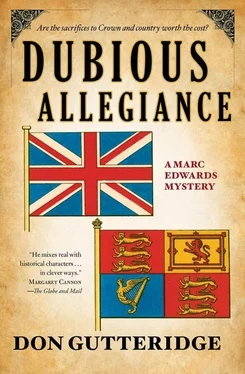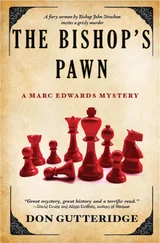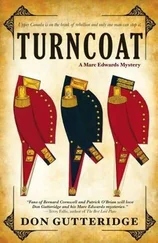Don Gutteridge - Dubious Allegiance
Здесь есть возможность читать онлайн «Don Gutteridge - Dubious Allegiance» весь текст электронной книги совершенно бесплатно (целиком полную версию без сокращений). В некоторых случаях можно слушать аудио, скачать через торрент в формате fb2 и присутствует краткое содержание. Год выпуска: 0101, Издательство: Touchstone, Жанр: Исторический детектив, на английском языке. Описание произведения, (предисловие) а так же отзывы посетителей доступны на портале библиотеки ЛибКат.
- Название:Dubious Allegiance
- Автор:
- Издательство:Touchstone
- Жанр:
- Год:0101
- ISBN:нет данных
- Рейтинг книги:5 / 5. Голосов: 1
-
Избранное:Добавить в избранное
- Отзывы:
-
Ваша оценка:
- 100
- 1
- 2
- 3
- 4
- 5
Dubious Allegiance: краткое содержание, описание и аннотация
Предлагаем к чтению аннотацию, описание, краткое содержание или предисловие (зависит от того, что написал сам автор книги «Dubious Allegiance»). Если вы не нашли необходимую информацию о книге — напишите в комментариях, мы постараемся отыскать её.
Dubious Allegiance — читать онлайн бесплатно полную книгу (весь текст) целиком
Ниже представлен текст книги, разбитый по страницам. Система сохранения места последней прочитанной страницы, позволяет с удобством читать онлайн бесплатно книгу «Dubious Allegiance», без необходимости каждый раз заново искать на чём Вы остановились. Поставьте закладку, и сможете в любой момент перейти на страницу, на которой закончили чтение.
Интервал:
Закладка:
A bugle on the parade-square sounded a peremptory blast. He had to go. There were immediate and overriding exigencies. He would find time to grieve his losses later. And for a while at least, he was not unhappy to buckle on his sabre and scabbard.
The John Bull, weighed down with eight infantry companies, four guns, and assorted baggage, tried to ram its way through the ever-thickening ice of the Richelieu River. Three hours and one mile later, Colonel Gore admitted defeat. So, shortly after noon on this first day of December, Gore’s brigade was once again on the river road. Whereas a week ago it had been wet snow, rain, and a muddy morass that had made the twenty-mile trek to St. Denis a living hell, it was now the frozen ruts (their own, alas) that made their passage no better than travelling over a rock-strewn wasteland. A corduroy road in April would have been heaven.
Despite the bone-jarring obstacles, they made good progress. The sun shone cold and bright. No skirmishers threatened from the occasional woods they had to pass through. When they marched into St. Ours at dusk, no sniper fired on them from the shuttered houses. Not a soul emerged to greet or spit at them. This time Gore called a halt, and the troops bivouacked for the night-to eat heartily and rest for the battle expected on the morrow.
The next morning dawned bright and clear. All the omens were good. Colonel Gore addressed the assembled troops. He reminded them of their duty to the Queen, made ambiguous references to the misadventures of the previous week, and concluded by asking them to remember how Captain Weir had been slaughtered, mutilated, and tossed aside like a butchered calf. “Do not be fooled,” he said in a pinched, effeminate drawl, “into thinking that because the rebels have no uniforms they are not soldiers determined to kill you in a blink. A farmer with a pitchfork is as murderous as a fusilier. And it was ordinary-looking ploughmen who stabbed Captain Weir to death and laughed at his sufferings. Show no mercy. Our orders are to defeat these outlaws utterly. Their leaders will be captured and clapped in irons. Any farmer or householder known to have taken part in the revolt is to have his goods confiscated and his buildings put to the torch. I know you will all do your duty. May God be with you.”
They were within a mile of St. Denis when Captain Riddell rode up beside Marc and engaged him in conversation.
“Major Jenkin was telling me that you’ve been involved in several murder investigations.”
“That’s true.” Marc smiled, relieved for the chance to talk about something other than war or politics. “I found them more diverting than cards and dice.”
“Everybody in the mess knew about how you helped catch Councillor Moncreiff’s killer, but I hadn’t known about the other two.”
“Well, I don’t boast about them, sir, because in my first investigation I managed to discover the killer, but he got away, in part because I wasn’t quick enough to nab him.”
“But you got him in the end?”
“With the help of others, yes. And his accomplice as well.”
“What happened in the third case?”
“Well, I did manage to solve it, but the killer bolted across the border.”
Captain Riddell, a jolly, open-faced Englishman, laughed. “Two out of three, eh? That may be a higher success rate than our good colonel will ever achieve!”
Marc acknowledged the point with a small, rueful smile.
“You did well out here last week,” Riddell said, suddenly grave. “You’re a natural soldier: no-one would have guessed it was your first engagement.”
“Thank you, sir.”
“By the way, I’ve written to Ensign Hilliard’s father. We’ll all miss him.”
Marc nodded, and they rode on in respectful silence.
They were approaching the creek where they had had so much trouble trying to save their twenty-four-pounder. The makeshift bridge had since been blown to pieces, but the cannon lay as they had left it-snout down in the mud, now frozen solid-like an ancient beast trapped forever in ice. Beyond it, the path to the coulee was littered with tree trunks to impede their progress towards the village and its fortifications. The colonel was about to send his sappers down to test the thickness of the ice when the scouts came riding back to make their report on what lay ahead.
The news took everyone by surprise. The rebels had deserted the town. The stone house was unoccupied. Several new ramparts had been constructed but were unmanned. Even the residents of St. Denis had, it seemed, taken to the woods. There would be no return engagement: the rebels had anticipated the result and, after the débâcle at St. Charles a few days before, had more or less abandoned the Richelieu Valley to its fate.
That fate was soon decided. Colonel Gore met with a delegation from the village, who had appeared as soon as the troops had gained the coulee. One of the elders, clutching a white rag in trembling hands, assured the colonel that Nelson and Papineau had fled to the United States. There would be no organized resistance. As innocent bystanders, they wished to be left in peace.
“I’ll determine who is innocent,” Gore proclaimed from his lofty perch. “I have orders to destroy the property of anyone who joined the renegades or aided and abetted them.” He turned to his captains. “We’ll start with the distillery.” He looked down at the old man. “You will point out to us Wolfred Nelson’s house and any others, as required. Meanwhile, we shall need billets in the town. I want the officers to secure these, and turn out any occupants who do not fully co-operate. If there is any real resistance, the premises are to be burnt to the ground.”
“It is starting to get dark, sir,” Captain Riddell said tactfully.
“Then the fires we shall start will burn more brightly, won’t they?”
Marc was relieved that his squad was assigned the task of reconnoitring the outskirts of the village and nearby woods to make sure there really were no rebels waiting to ambush or entrap the invaders. However, the only people they scared up in the fast-failing light were townsfolk hiding among the trees, cold and starving. Many refused to return to their homes, awed by the spectacle of flames roaring into the sky from several houses in the distance. But the presence of the government troops soon became known to another group also hiding out in the woods: those few loyalists, most of them English-speaking Tories, who had remained faithful to the Crown and had suffered for it by having their barns razed, their crops and cattle stolen, and their lives threatened. They knew exactly which locals had made their lives miserable since Lord Gosford, the civilian governor, had left them to the mercies of Papineau and the Papists. And they wanted revenge. Now.
By the time Marc rode back into the village to report to Captain Riddell that the periphery of the town was clear of the enemy, the local Tories were already in the process of leading squads of soldiers along the narrow streets, pointing out the houses of traitors and seditionists. Moments later, these burst into flames.
“Jesus, we don’t even know whether these wretches are guilty of anything,” the captain said, his face dark with anger. “A single finger pointed that way, and it’s all over. I didn’t join the army to burn out civilians and raze crops. Christ, these people are all starving!”
“What are my orders, sir?”
“Take your troop and clear out that log house up there at the end of this street.”
“And set it on fire?”
“I’m afraid so, Lieutenant. Colonel Gore insists it was used to hide rebels.”
Marc sighed, but nodded his assent, numbly. As much as he had tried to suppress such thoughts, all he could think of-here among the wailing of women and children as they fled their flaming homes, the shouts of rage and defiance among the returning Tories, the flare of sudden conflagrations against an indifferent, indigo sky-was that this sort of chaos and self-perpetuating reprisal could very easily happen in Upper Canada. With barn burnings, secret assassinations, and the rule of law frayed by rage.
Читать дальшеИнтервал:
Закладка:
Похожие книги на «Dubious Allegiance»
Представляем Вашему вниманию похожие книги на «Dubious Allegiance» списком для выбора. Мы отобрали схожую по названию и смыслу литературу в надежде предоставить читателям больше вариантов отыскать новые, интересные, ещё непрочитанные произведения.
Обсуждение, отзывы о книге «Dubious Allegiance» и просто собственные мнения читателей. Оставьте ваши комментарии, напишите, что Вы думаете о произведении, его смысле или главных героях. Укажите что конкретно понравилось, а что нет, и почему Вы так считаете.












